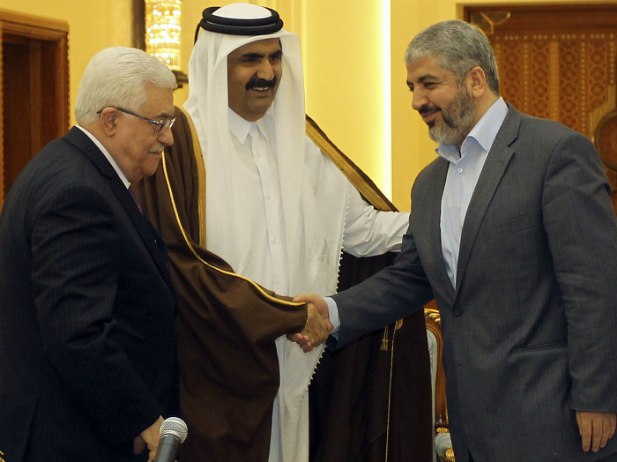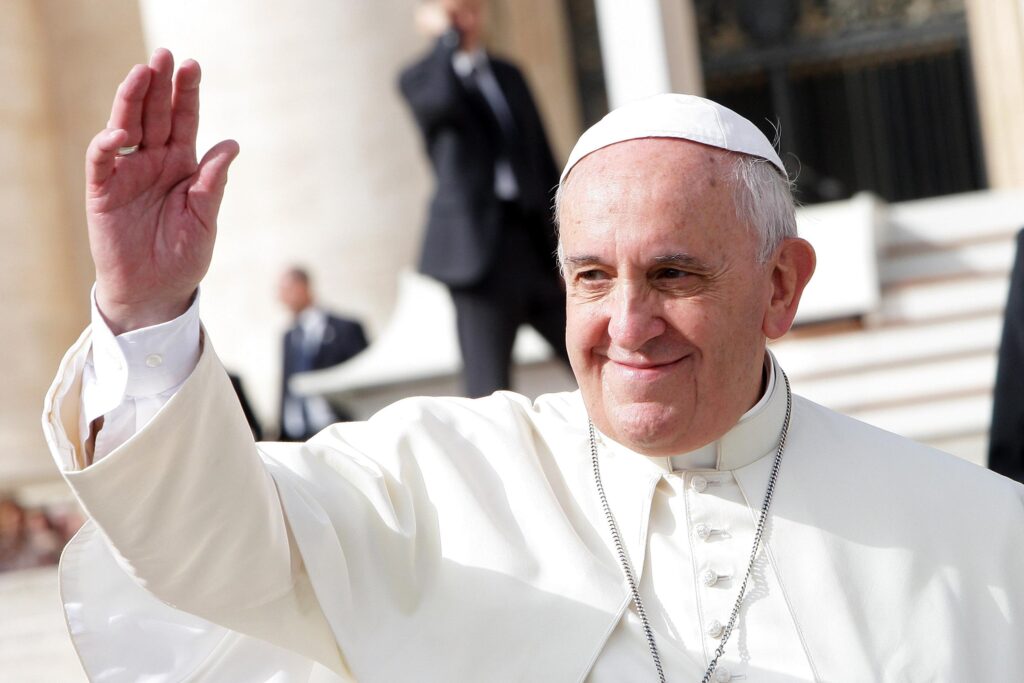UPDATES
The latest Fatah-Hamas agreement in Doha
February 8, 2012

Update from AIJAC
February 8, 2012
Number 02/12 #03
This Update is dedicated to the latest Fatah-Hamas unity agreement, signed in Doha, Qatar on Monday, which calls for current PA President Mahmoud Abbas to also become Prime Minister.
First up is Robert Danin from the Council on Foreign Relations, who examines the actual significance of this agreement, the latest of many, as well as the key questions that will have to be settled if the agreement is to stick. He also discusses in particular Abbas’ motivation – an apparent effort to create two parallel tracks, the Jordanian-mediated one of negotiations with Israel, and the Qatari-sponsored track of reconciliation with Hamas. Danin is sceptical Abbas can succeed with Hamas and says Abbas is likely to have to make the tough choice between the two he has been seeking to avoid. For Danin’s analysis in full, CLICK HERE. Danin also notes that Abbas’ new role as PM appears illegal under the Palestinian Authority’s Basic Law – this is discussed in more detail by Elliot Abrams.
Next up is noted Arab-Israeli journalist Khaled Abu Toameh, a reporter with strong sources in all factions of Palestinian politics, who tries to put the latest unity agreement into the context of the various past “unity” agreements that have been brokered between Hamas and Fatah – by Egypt, by Saudi Arabia, and by Yemen. Abu Toameh notes that Qatar is trying to take over the role of Egypt, currently too pre-occupied to notice, as leader of the Arab world. But exploring the opposition the deal is likely to encounter from both Fatah and Hamas sources, Abu Toameh makes it pretty clear that there are good reasons to doubt that the new agreement will be any more effective than any of its predecessors. For his complete argument, CLICK HERE. Abu Toameh also published some interesting commentary last week pointing out that Abbas’ exclusion of any new young blood from the leadership of Fatah makes it likely Fatah will lose any election that takes place under a Fatah-Hamas agreement.
Finally, the Jerusalem Post published an insightful editorial on the agreement and its implications. The paper notes that the agreement comes in the context of the growing legitimacy being bestowed on Hamas both across the Middle East and in international diplomatic circles. But, the paper makes it clear, there is no reason to expect that Hamas has changed its antisemitic extremist worldview, nor its dedication to terrorist methods, and argues that allowing Hamas to join the PLO would be far more likely to lead to a Hamas takeover of the organisation than moderation of Hamas. For the rest of what the paper has to say, CLICK HERE. For those who didn’t see it, the Australian also had a very insightful editorial on the Hamas-Fatah deal today (subscription required, unfortunately).
Readers may also be interested in:
- A good analysis of how Hamas is manoeuvring to attempt to use current changes in the Arab world to get itself recognised as the leader of the Palestinian cause. Another look at Hamas and the Arab Spring comes from the Turkish Newspaper Hurriyet.
- Former Muslim radical turned reformist analyst Ed Hussein on why whitewashing Hamas is a mistake.
- The Palestinian Authority appointed Mufti of Jerusalem recently publicly cited a Hadith (a saying attributed to the prophet Muhammed) which apparently calls for Muslims to kill all Jews. Some comments linking these remarks with the behaviour of a previous Mufti of Jerusalem, Haj Amin al-Husseini, who became a close Nazi ally, are here and here.
- A good comment on the problems for peace with the Palestinian narrative of victimhood from noted American political scientist Prof. Michael Curtis.
- Four noted Israeli political scientists provide a reasoned and careful look at recent Israeli legislative proposals that sparked accusations that Israeli democracy was somehow under threat.
- Some examples from the many stories and comments now appearing at AIJAC’s daily “Fresh AIR” blog:
- Iranian sources discuss the timing and details of an attack on Israel.
- A post on the strange definition of “occupation” that the UN applies to Gaza.
- Hezbollah’s response to the unrest in Syria is to threaten to attack Israel.
- A new regular feature on Fresh AIR, “The Daily Dose” – recommended reading on the latest news and analysis of the day.
The Doha Palestinian Unity Agreement: Now the Hard Part
by Robert M. Danin
Council on Foreign Relations, February 6, 2012
Today’s Fatah-Hamas unity agreement announced in Doha marks the latest in a series of unimplemented accords between the two Palestinian adversaries. The two sides announced—again—their intention to unify their efforts and form an independent caretaker government to shepherd the Palestinians in both the West Bank and Gaza to new elections. In an innovation that apparently violates the Palestinian Basic Law, the two sides agreed that Mahmoud Abbas would serve as both president and prime minister of the Palestinian Authority (PA). Recall, the PA’s prime minister position was established in 2003 and Abbas was appointed to that post to reduce the absolute powers of the presidency, then in Yassir Arafat’s hands. Ironically, it is now Abbas as president who is seeking to claim back what he once tried to take away.
Today’s announcement is more of a statement of intent than it is a full-fledged accord. When it comes to Palestinian unity agreements–and there have been a few–the announcement is the easy part. Recall the February 2007 Mecca Accords and last April’s unity agreement–each either collapsed rather quickly or were never even implemented. In the case of last April’s unity agreement, many of the key details were left to be resolved. Such is the case today. Will finances be shared under the unity agreement? Will Hamas agree to disband, let alone agree to recognize previous PLO agreements (including recognition of Israel)?
Another key question is: just how independent would such a transitional government be? The approach adopted last April, while calling for a technocratic government, also called for an outside steering committee comprised of Hamas and Fatah that would provide direction to the government. Such directional control would have been enough for such a government to be considered untouchable by the United States, and probably the other members of the Quartet. These kinds of critical details will need to be addressed before the two sides reconvene in Cairo on February 18 as they have agreed to do.
Perhaps the more interesting question is why, after just last week when Fatah officials criticized Hamas for failing to consult in earnest, did the two sides come together with today’s shotgun announcement? Two sets of shifting, interrelated regional dynamics are at play here. First, both Fatah and Hamas have effectively lost their respective patrons—Mubarak in the former case, and Assad in the latter. This has created something of a vacuum that has led to a second phenomenon: other regional players stepping in to try to help encourage Palestinian developments along. Over the past month, Jordan has shepherded talks with Israel in an effort to guide the two parties back to final status negotiations. Amidst intensive Jordanian diplomatic efforts, the Qataris called Abbas and Khaled Meshal to Doha, and apparently made them an offer they couldn’t refuse. It remains to be seen if Abbas said yes as a polite guest, or if he is serious about moving forward.
In all likelihood, Abbas probably said yes in order to create options for himself and create two parallel tracks—a potential negotiating track brokered by the Jordanians and the Quartet, and a reconciliation track brokered by Qatar. Such an approach will not be welcomed by many in the region—Israel has already registered its strong opposition—and others such as Jordan and the United States will also likely tell Abbas that he can only have one approach: negotiations with Israel that do not include Hamas. Yet, Abbas will want to keep his options open.
It is possible that this time is different, and that the region’s uprisings have so altered Palestinian politics that real reconciliation will now ensue, leading to new elections later this year. The fundamentals still argue against it: Fatah enjoys exclusive control of the West Bank and is fighting Hamas on the ground to keep it that way; similarly, Hamas is resisting any Fatah encroachment on their supremacy in Gaza, and it is inconceivable that the militant Islamist organization will relinquish control there should it lose elections. Hence, PLO chairman and PA president Mahmoud Abbas must make some difficult choices now: reconcile with Hamas thereby establishing greater Palestinian unity but incurring greater international (and possibly regional) isolation and risk losing his Fatah party’s remaining control in a region quickly giving rise to Islamist parties. Or partner with the initiative launched by neighboring Jordan and endeavor to negotiate with Israel has he has long professed as his preference.
Back to Top
————————————————————————
Analysis: Will Qatar succeed where others have failed?
Saudi Arabia, Yemen, Egypt all tried mediating Fatah and Hamas in previous efforts.
By KHALED ABU TOAMEH
Jerusalem Post, 02/07/2012 01:25
First there was the Saudi-sponsored Mecca Agreement between Fatah and Hamas in February 2007. That agreement collapsed four months later when Hamas seized control over the Gaza Strip from the Fatah-dominated Palestinian Authority.
Then came the Sanaa Agreement in March 2008 in Yemen. That agreement lasted only a few hours before it was pronounced dead by the two parties.
The Yemeni agreement was followed by two similar reconciliation pacts that were reached under the auspices of the Egyptians. Needless to say, the Egyptian-brokered accords remained ink on paper.
Today, it’s the Qataris moment to take a shot at solving the Hamas-Fatah rivalry.
Qatar is hoping to replace Egypt as the major powerbroker in the Arab world, particularly in light of the fact that the Egyptians are too preoccupied with their internal problems and have apparently given up on Hamas and Fatah.
Now it remains to be seen whether Qatar would be able to succeed where others failed.
Given the many problems facing both Abbas and Mashaal within their own groups, it’s hard to see how the new deal could work.
Abbas and Mashaal went to Qatar after they failed to implement the last Egyptian-brokered reconciliation agreement that was announced in Cairo in May 2011.
The Egyptian-sponsored agreement faced many obstacles, mainly strong opposition inside both Fatah and Hamas.
Abbas has been under attack by some top Fatah officials who don’t want to see Hamas incorporated into the PLO and PA. Some of these officials have even warned Abbas against holding new elections at a time when Fatah is set to suffer another defeat, as was the case in the 2006 parliamentary vote.
Mashaal, too, has been facing huge challenges.
First, he has been forced to leave Syria because of his refusal to support President Bashar Assad against the popular uprising that has been sweeping his country for nearly a year. Hamas leaders are today scattered in the Gaza Strip and a number of Arab countries, including Egypt and Jordan.
Second, Mashaal’s overtures to Fatah and a number of “moderate” Arab countries like Jordan and Qatar have cost Hamas the political and financial backing of Iran.
Third, Mashaal’s reconciliation with Fatah has alienated several top Hamas leaders in the Gaza Strip who believe he has “betrayed” the Islamist movement’s ideology and strategy.
Monday’s Doha Declaration has already drawn sharp criticism from many Hamas officials and activists who expressed outrage over the idea that Abbas would serve as interim prime minister of a unity government.
Some Palestinians said Monday they don’t rule out the possibility that the Qatari-engineered reconciliation accord would lead to splits inside both Fatah and Hamas.
It now remains to be seen whether Abbas and Mashaal would be able to convince their followers to endorse the new deal. If they fail, the only question would be: Which Arab country would be the next to mediate between the two rival parties?
Back to Top
————————————————————————
EDITORIAL: Unity or peace
Jerusalem Post, 02/07/2012 23:06
The idea that it’s impossible to reconcile a Fatah-Hamas unity deal with an Israeli-Palestinian peace initiative was not clear to all.
Hamas, recognized as a terrorist organization by the European Union and the United States, appears to be undergoing a worrisome process of legitimization of late.
Over the past few months, Ismail Haniyeh has been meeting and greeting the heads of numerous “moderate” Muslim states, including Turkey, Tunisia, Egypt and Bahrain, where he has been received with much pomp and ceremony. Hamas leader Khaled Mashaal, accompanied by Qatar’s crown prince, Tamim bin Hamad bin Khalifa al-Thani, was, meanwhile, hosted at the end of January by Jordan’s King Abdullah II.
All of these meetings, even if they have only symbolic meaning, mark a change in the way states in the region view Hamas. In the past, Sunni Arab rulers nominally aligned with the West shunned Hamas. Sunni Hamas was forced to form allegiances with Alawiteruled Syria and Shi’ite Iran.
However, with the rise of the Muslim Brotherhood in Egypt and the Brotherhood-affiliated Ennahda party in Tunisia, Hamas – also a Muslim Brotherhood offshoot – has gradually undergone a process of reorientation, aligning itself and identifying with the popular uprisings in the region known as the Arab Spring.
Hamas’s latest bid for normalization was Monday’s Doha Declaration, a reconciliation agreement designed to end differences between it and Fatah. Signed under the auspices of Qatar, the declaration appoints Palestinian Authority President Mahmoud Abbas as interim prime minister of a joint Hamas-Fatah unity government.
The main mission, the agreement stipulates, would be to prepare for presidential and parliamentary elections and rebuild the Gaza Strip. Incorporation of Hamas into the PLO, which consists of several groups, the largest of which is Fatah, will also be discussed. If all goes as planned, Hamas will become an integral part of the official Palestinian political leadership.
The only problem with all of this unity is that Hamas remains an anti-Semitic terrorist organization committed to the destruction of Israel. Hamas, which includes in its official charter The Protocols of the Elders of Zion, has not accepted the three minimal requirements for official recognition demanded of it by the Quartet on the Middle East, a mediating body made up of representatives of the US, the UN, Russia and the EU. These requirements are recognizing Israel’s right to exist, abandoning terrorism, and accepting previous Israeli- Palestinian agreements.
During his visits around the region, Haniyeh reiterated Hamas’s well-known position calling for the “liberation of Palestine from the Jordan [River] to the [Mediterranean] Sea” through jihad. He vowed never to recognize the “Israeli entity” and said he would leverage the Arab Spring to achieve this goal.
Under the circumstances, Prime Minister Binyamin Netanyahu’s reaction to the Doha Declaration was eminently reasonable: “President Abbas, you can’t have it both ways. It’s either a pact with Hamas or peace with Israel. It’s one or the other. You can’t have them both.”
Unfortunately, the idea that it is impossible to reconcile a Fatah-Hamas unity deal with an Israeli-Palestinian peace initiative was not immediately clear to all.
A spokesman for EU foreign policy chief Catherine Ashton repeated the EU’s position that it considers Palestinian reconciliation an important step toward Mideast peace. Meanwhile, UN Secretary-General Ban Ki-moon told Abbas that reconciliation between Fatah and Hamas should not be seen as contradictory or mutually exclusive with negotiations with Israel.
It is imperative that the international community stand by the Quartet’s three conditions for normalizing relations with Hamas. So long as Hamas continues to hold to its commitment to violent struggle, refuses to recognize Israel and rejects past peace agreements, it will be impossible to develop formal ties with Hamas – or with a Palestinian leadership willing to enter into a unity agreement with it.
Many in the international community might be under the false impression that recognizing a Palestinian government that includes the terrorist organization will enable the more moderate Fatah to effect change in Hamas. But we believe it is much more likely that Hamas, riding a wave of new-found popularity in the region, will gradually take over Fatah.
Tags: Palestinians





